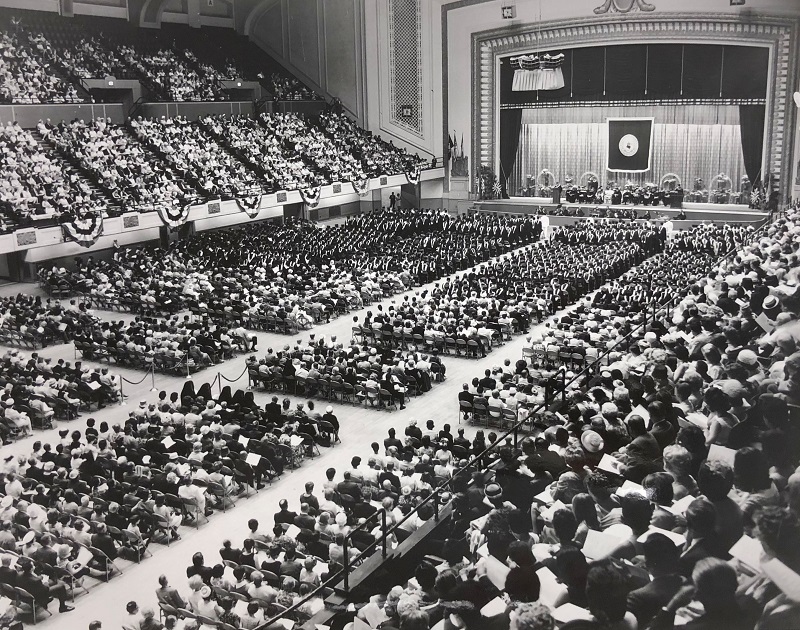Biologist, Philosopher, Researcher, Falvey Scholar: Meet Elizabeth “Libby” O’Brien

Elizabeth “Libby” O’Brien receives the Falvey Scholar Award from Associate University Librarian for Collections and Stewardship Jeehyun “Jee” Davis.
BY SHAWN PROCTOR
This is part 2 of a 6-part series featuring the 2019 Falvey Scholars. Read more about them every Tuesday and in the upcoming issue of Mosaic: the library’s bi-annual publication.
Scholarly Stats:
Elizabeth “Libby” O’Brien ’19 CLAS
Hometown: Portland, Maine
Faculty Mentor: Samantha Chapman, PhD, associate professor of Biology
Research: Foliar water uptake in ecotonal mangroves which are expanding with climate change
Other Honors: Fulbright U.S. Student Program award winner, will continue her thesis work analyzing mangrove ecology and environmental ethics in the Philippines.
In her own words:
Libby’s Research:
While working with Drs. Chapman and Matthew Hayes in a Florida saltmarsh on their research analyzing mangrove ecology in the face of climate change, I began to ponder about an idea that would become my thesis question: “What if mangroves supplement their water needs not from their roots, where they are competing with the marsh species, but through their leaves?”
At Villanova in the fall, the three of us sat down and revisited that question. In our preliminary literature review, we found evidence that a number of plant species use foliar water uptake across ecosystems, particularly where water availability can be limited such as high, mountainous elevations and dry, arid environments.
Mangroves are specialized plants that live in salty water. Due to the high salinity concentration of their soils, they are often under water stress as they need to extract, and filter water out of this salty environment to meet their physiological demands. In short, mangroves are living under pseudo-drought conditions. However, coastal mangroves sometimes encounter sea mist and fog, leading us to believe that they may utilize foliar water uptake in a similar way to other plants living under drought conditions.
Our second research question was “Do different mangrove species exhibit varying degrees of foliar water uptake?”
 We aimed to answer this second question to provide evidence for existing geographic distributions of specific mangroves species and their projected future encroachment patterns.
We aimed to answer this second question to provide evidence for existing geographic distributions of specific mangroves species and their projected future encroachment patterns.
To test our hypotheses, we built airtight chambers and placed the three different species of mangroves inside of them. We used humidifiers to mimic morning fog enriched with a tracer that could be detected by a machine in the lab after the experiment. Since we sealed off the soil from the rest of the plant, (meaning that the soil was not moistened by the fog), any tracer detected in the leaves of the mangroves would indicate foliar water uptake.
Using statistical analyses, we could identify trends in the data to answer both of our research questions. Once in the lab, we did detect the tracer in all of the species, pointing to some foliar water uptake, but we also discovered problems in our experimentation methods. This meant that while our results were promising, there were a few possibilities as to why they were what they were.
However, the three of us do not take this as a failure. If we had not done the experiment, we would not have known that mangroves exhibit some foliar water uptake; and even if it is impossible to parse out the differences in foliar water uptake across species at this time, we have a solid research process on which to build on moving forward.
Setbacks like this are not only common, they are inevitable. We are currently in the process of re-examining our methods to produce more reliable results. Moreover, I come away with a confidence in my ability as a woman in science moving on to answer the next questions.
Libby’s “Falvey Experience”:
In order to begin the development of my research questions, and throughout every subsequent step of my thesis, I needed to be a sponge for information. At first, it was overwhelming to experience a total information overload, but three things kept my project focused and achievable.
The access that Falvey’s online resources provided proved invaluable. The access that I was able to have to high profile academic journals and niche, often international journals, as well as published theses exposed me to the diverse and interdisciplinary research within the realm of mangrove ecology.
For the articles that were not immediately available to me, I used interlibrary loan. I was able to develop my experimental design from one article that I got through the interlibrary loan system, a resource that then-research librarian Robin Bowles (now the director of Libraries at Montgomery County Community College) pointed me towards—she was instrumental in my successful thesis completion.
Her knowledge and experience for sifting through endless articles and culling searches gave me papers that addressed my specific questions. I live-chatted with her in one instance which enabled me to get help from the library and keep working.
Finally, Falvey Memorial Library provided me with the space to work and collaborate with my mentors, a contribution that I cannot ignore. The 24-hour access to workspaces, printers, and online resources eliminated many of the obstacles a commuter student like myself might have faced in order to finish my thesis on a deadline.
Over this past year, at the back left square table of the library Holy Grounds, Dr. Chapman, Dr. Hayes, and myself drank endless cups of coffee and discussed how our mangrove foliar water uptake results fit into the larger conversation of coastal climate change.
The Impact on Her:
From Florida saltmarshes to Mendel Science Center, climate change challenges our status quo. As a soon to be graduate from a rigorous Augustinian institution, I am equipped with the skills to analyze, engage with, and speak about the processes behind the issues that affect our everyday lives.
My thesis, an investigation into foliar water uptake as a potential water acquisition strategy in mangrove species, offers a contribution to the scientific community in the context of coastal ecosystem ecology, as well as to Villanova University as an example of what a student committed to conducting research can achieve.
F rom the completion of my thesis, I have learned that the hardest part about research is narrowing the focus of your questions because analyzing the implications in the larger scheme of things comes later. I have learned that I respond well to a mentorship style that gives me the space to try and fail and re-try lab techniques, and that it is essential to take advantage to the resources available.
rom the completion of my thesis, I have learned that the hardest part about research is narrowing the focus of your questions because analyzing the implications in the larger scheme of things comes later. I have learned that I respond well to a mentorship style that gives me the space to try and fail and re-try lab techniques, and that it is essential to take advantage to the resources available.
Falvey Memorial Library facilitated so much of my research success; from that, I have grown to have a passion for asking and answering research questions.
What’s Next:
After my Fulbright U.S. Student experience, I am planning to attend graduate school. I aim to continue this work but also integrate my research in philosophy in the coming years as I pursue a doctorate that blends ecological research with ethical considerations in a project that explores mangrove productivity and success through a lens of anthropogenic influence.
My mentors’ attention to both of these interests throughout this year motivated me to pursue a career that combines science and policy advocacy.
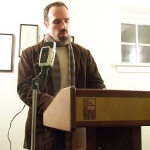
Shawn Proctor, MFA, is communications and marketing program manager at Falvey Memorial Library.
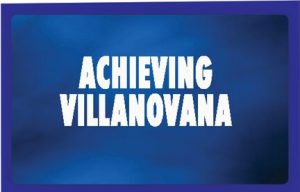
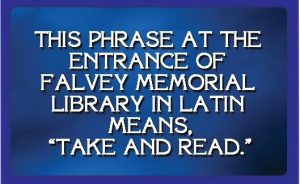
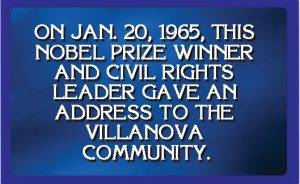


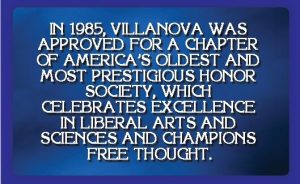
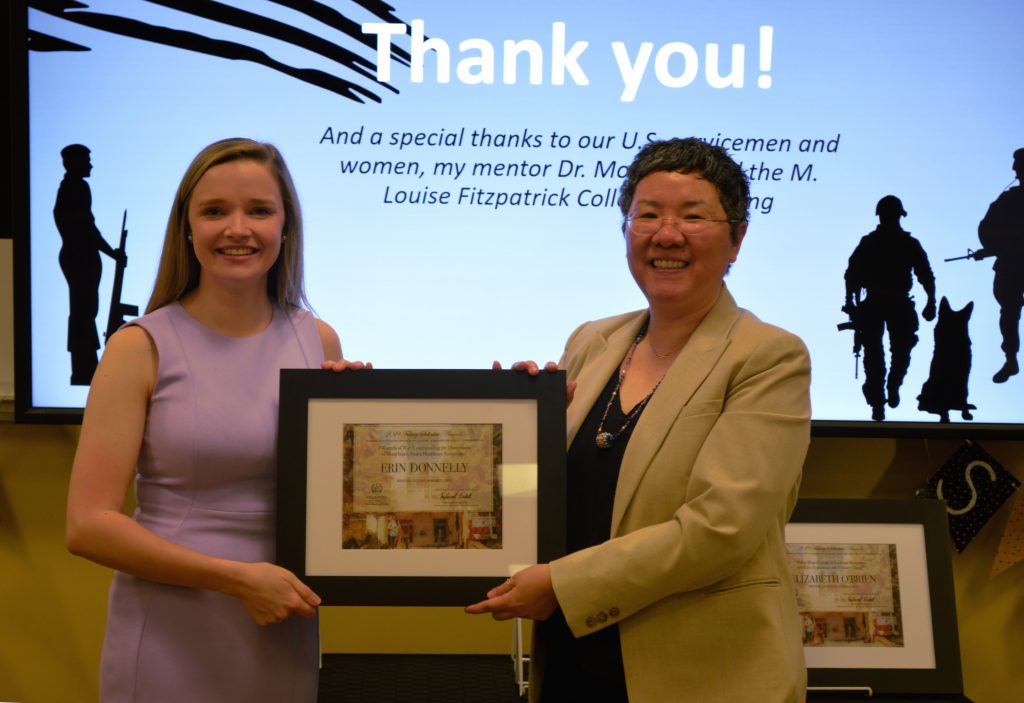
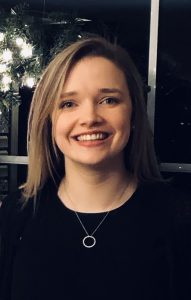 Since research on moral injury is in its infancy, I had to search in many disciplines to find emerging literature. I used CINAHL, PubMed, and ProQuest to find the majority of my scholarly sources. I was also able to cite these sources easily by exporting to RefWorks and using the citation links provided by ProQuest. Villanova gave me access to articles from the journals.
Since research on moral injury is in its infancy, I had to search in many disciplines to find emerging literature. I used CINAHL, PubMed, and ProQuest to find the majority of my scholarly sources. I was also able to cite these sources easily by exporting to RefWorks and using the citation links provided by ProQuest. Villanova gave me access to articles from the journals.